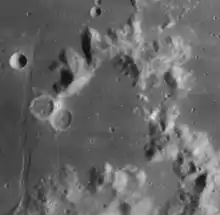 Lunar Orbiter 4 image | |
| Coordinates | 33°42′N 37°00′E / 33.7°N 37.0°E |
|---|---|
| Diameter | 35 km |
| Depth | 1.1 km |
| Colongitude | 323° at sunrise |
| Eponym | Asaph Hall |
Hall is a lunar impact crater in the southeast part of the Lacus Somniorum, a lunar mare in the northeast part of the Moon. It was named after American astronomer Asaph Hall.[1] This feature can be found to the east of the prominent walled plain Posidonius. Just to the south, and nearly attached to the southern rim of Hall is the smaller crater G. Bond.
This crater formation has been significantly disintegrated by smaller impacts around the outer rim, leaving a wall that is deeply notched and incised. There is a gap in the western rim through which the interior has been flooded and resurfaced by layers of basaltic lava. Thus all that remains of the original crater is an irregular, crescent-shaped formation along the southern edge of the Lacus Somniorum. The southern rim is attached to the rough terrain to the south of the mare, and the irregular satellite crater G. Bond G is attached to the southeast rim.
Passing across the open mouth of this crater is the rille named Rima G. Bond (after the nearby crater), a wide cleft in the surface of the mare. This feature begins to the north of Hall and travels to the south-southwest, gradually bending back to the south-southeast. It passes through a section of raised terrain along the southern edge of the mare, and this rise joins the southern rim of Hall and encloses G. Bond.
Satellite craters
By convention these features are identified on lunar maps by placing the letter on the side of the crater midpoint that is closest to Hall.

| Hall | Latitude | Longitude | Diameter |
|---|---|---|---|
| C | 34.7° N | 35.8° E | 6 km |
| J | 35.4° N | 36.9° E | 8 km |
| K | 35.5° N | 34.2° E | 8 km |
| X | 35.7° N | 37.8° E | 4 km |
| Y | 36.4° N | 36.9° E | 4 km |
References
- ↑ "Hall (lunar crater)". Gazetteer of Planetary Nomenclature. USGS Astrogeology Research Program.
- Andersson, L. E.; Whitaker, E. A. (1982). NASA Catalogue of Lunar Nomenclature. NASA RP-1097.
- Bussey, B.; Spudis, P. (2004). The Clementine Atlas of the Moon. New York: Cambridge University Press. ISBN 978-0-521-81528-4.
- Cocks, Elijah E.; Cocks, Josiah C. (1995). Who's Who on the Moon: A Biographical Dictionary of Lunar Nomenclature. Tudor Publishers. ISBN 978-0-936389-27-1.
- McDowell, Jonathan (July 15, 2007). "Lunar Nomenclature". Jonathan's Space Report. Retrieved 2007-10-24.
- Menzel, D. H.; Minnaert, M.; Levin, B.; Dollfus, A.; Bell, B. (1971). "Report on Lunar Nomenclature by the Working Group of Commission 17 of the IAU". Space Science Reviews. 12 (2): 136–186. Bibcode:1971SSRv...12..136M. doi:10.1007/BF00171763. S2CID 122125855.
- Moore, Patrick (2001). On the Moon. Sterling Publishing Co. ISBN 978-0-304-35469-6.
- Price, Fred W. (1988). The Moon Observer's Handbook. Cambridge University Press. ISBN 978-0-521-33500-3.
- Rükl, Antonín (1990). Atlas of the Moon. Kalmbach Books. ISBN 978-0-913135-17-4.
- Webb, Rev. T. W. (1962). Celestial Objects for Common Telescopes (6th revised ed.). Dover. ISBN 978-0-486-20917-3.
- Whitaker, Ewen A. (1999). Mapping and Naming the Moon. Cambridge University Press. ISBN 978-0-521-62248-6.
- Wlasuk, Peter T. (2000). Observing the Moon. Springer. ISBN 978-1-85233-193-1.